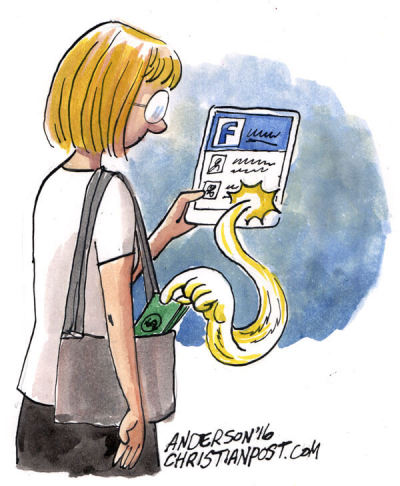Ask Chuck: Protect yourself and your loved ones during the holidays
Dear Chuck,
My elderly parents get scam phone calls, emails and texts constantly. I worry they are going to fall for one of these since both are kindhearted and trusting. I know they are vulnerable. How do I help them?
Worried about Scams
Dear Worried about Scams,

The Lord detests lying lips (Proverbs 12:22), and so do I! Often, when I am speaking with my 88-year-old dad on his mobile phone, his landline phone (remember those?) rings in the background. I ask him if he needs to answer it, and usually he says, “No, probably just another scam.” While I am glad to hear him acknowledge that he is aware that he is a target, I wonder if he will always be able to keep up his defense.
The sad reality is that we are all vulnerable to being ripped off, especially during the peak spending season. Billions of dollars are lost in holiday scams every year! Here are some ways to help your parents and yourself identify some common scams and defend against being ripped off.
Elder scams
The FBI lists the most common types or categories of schemes to defraud elders:
- Romance
- Tech support
- Grandchild needs money
- Government impersonation
- Sweepstakes/charity/lottery
- Home repair
- Family/caregiver
- Reverse mortgages
This does not include recent COVID-19 scams or early payment of government stimulus checks!
See the FBI’s information regarding common scams.
Online shopping scams
Earlier this month, Trend Micro warned shoppers to beware of holiday online shopping scams. These involve fake shops, phishing, E-skimming, and pop-up ads.
Red Flags
- Deals that are too good to be true
- Product page with 5-star and possibly irrelevant customer reviews
- Credit card payments are not accepted, but cash apps or wire transfers are
- Detailed personal information must be provided
- Web pages contain typos and grammatical errors
- Strange website address with no contact details
Safety Tips
- Only shop legitimate sites
- Don’t make purchases on social platforms
- Search reviews for companies first
- Use credit cards, not cash apps or wire transfers, for secured transactions
- Never click links/attachments from unknown sources
Travel scams
The Better Business Bureau (BBB) receives a large number of travel scam reports around the holidays. These are the top five most reported:
- Vacation rental scams
- Free vacation scams
- Hotel scams
- Third-party booking site scams
- Timeshare reselling cons
The BBB recommends the following guidelines:
- Get trip details in writing before making a payment
- Avoid deals that sound too good to be true (Sound familiar?)
- Use credit cards, and do not wire money or use cash apps or prepaid debit cards
- Call the rental owner. Do not rely solely on email. Beware of vague answers
- Unsolicited offers are red flags, especially those that are time-sensitive
Scams targeting apple owners
Apple ID Phishing Scams involve hackers who aim to get Apple IDs and passwords. iPhone users need them to access services for the App Store, Apple Music, iCloud, iMessage, and FaceTime. Common scams ask you to click on a link or call a number for some important-sounding reason. Often, victims react and fail to think logically. An Apple virus warning is one such example. Beware of the following:
- Apple ID order receipt: An email appears to be from Apple and states that your ID has been used to make a purchase. “Proof” may be attached to lure you to confirm or submit payment via your ID and password.
- Apple ID locked: An email notification warns of a suspicious activity or an ID expiration notice. Steps to unlock involve submitting personal identification. If legitimately locked, a phone call can be made to Apple. IDs do not expire.
- Apple support scams: Phone calls inform you that your Apple ID has been compromised. They want your information to fix the problem. Apple will not call you unless you first make a request.
- iPhone locked: At this point, you have fallen prey to a scam, and hackers have remotely locked it. A pop-up message requires a ransom to unlock.
- Calendar invitation: Invitations to click on questionable calendar invites can cause numerous problems. Learn how to stop and remove calendar spam.
In addition:
- Make sure anti-virus software is up to date
- Look for the closed-lock icon for websites and an address that begins with HTTPS
- Avoid sites that do not provide a physical address, phone number, and privacy policy
- Fraudulent shipping notices can appear legitimate but if clicked can download malware
- Only use tracking numbers provided with purchases
- Monitor your accounts regularly
- Know the importance of guarding your phone number
Unfortunately, there are endless ways that deceivers can come up with to take advantage of others through fraud. Pray with and for your parents about this concern. Consider sharing this article with them and discuss areas they need to be more guarded. Ask the Lord for His wisdom and discernment as you seek to help them.
It is the season for giving thanks. Thank you to my wife, Ann, for her careful research, writing, and insights that help me form and improve this article each week. Also, thank you to Elissa, Stephanie, and Melinda for their help with editing and production. Thank you to The Christian Post for publishing this column. And thank you to those who read and share it. I hope you actively and sincerely count your blessings for all that the Lord has given you that money cannot buy.
In this peak spending season, I caution you to be careful with credit card debt, and if you need help reducing it, please consider contacting Christian Credit Counselors. They are a trusted source of help.
Chuck Bentley is CEO of Crown Financial Ministries, a global Christian ministry, founded by the late Larry Burkett. He is the host of a daily radio broadcast, My MoneyLife, featured on more than 1,000 Christian Music and Talk stations in the U.S., and author of his most recent book, Seven Gray Swans: Trends that Threaten Our Financial Future. Be sure to follow Crown on Facebook.





























